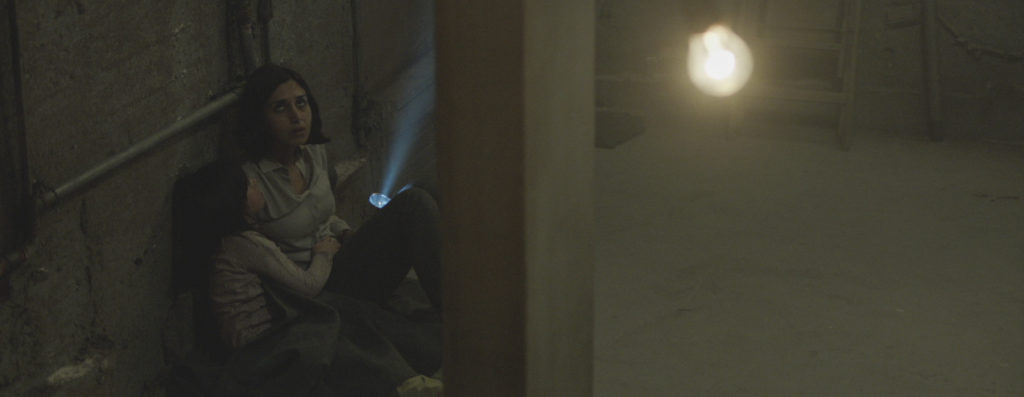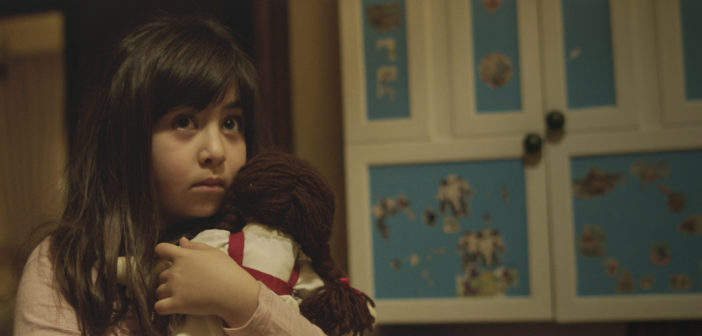“Where there is fear and anxiety, the “winds” blow.”
Fear and anxiety are the key driving forces behind Babak Anvari’s debut feature Under the Shadow. Anvari’s film is a tight and effective psychological horror film, built around the tenuous relationship between a mother and her young daughter. There have been several outstanding films about mothers and sons of late (The Babadook and Goodnight Mommy come to mind), and while Under the Shadow sits in this same cinematic space, the exploration of the female dynamic, especially under the shadow of the Iranian Revolution allows this film to address certain themes that the mother/son films weren’t able to.
Set in Tehran in 1988, at the tail end of the eight year Iran-Iraq war, the film begins with Shideh (Narges Rashidi) attempting to return to her medical studies. She is denied, due to past political activity, thus setting up one of the narrative strands of Under the Shadow – the difficulty of a woman, particularly a strong and focussed woman, to be herself under the rule of the Islamic Shia government. Shideh’s husband Iraj (Bobby Naderi) is a doctor, who seemingly understands his wife’s disappointment at her inability to continue her medical studies, while also deriding her for being politically active and not being focussed enough to study. When Iraj is conscripted to medical service in the war, Shideh is left alone with Dorsa (Avin Manshadi), their young daughter. Shideh stubbornly refuses to leave Tehran, despite the increasing Iraqi offensive, and after several close calls and hours spent in the basement shelter, their apartment building is finally hit by an Iraqi missile. It is at this point of the film that things begin to psychologically shift. Until this point, Under the Shadow has been a slow building domestic thriller, but the missile attack allows the focus to shift from the day to day to more spiritual, or supernatural aspects.
Dorsa’s favourite doll goes missing in the strike, and there are whispers of the Djinn being responsible. The Djinn are ancient Arabic spiritual entities, or demons. In the film we learn they move with the winds: “The “winds” refer to mysterious, ethereal and magical forces, which can be anywhere…” Tensions begin to rise as Dorsa goes into an extended fever, which is unable to be broken. Again, superstitious neighbours attribute this to the manifestation of the Djinn. Shideh is unable to find Kimia, Dorsa’s doll, and suspicions arise between mother and daughter at a series of bizarre domestic happenings. As Shideh gets caught up in the belief of the Djinn, both her and Dorsa experience physical manifestations of these spirits. After a particularly frightening encounter in the middle of the night, Shideh and Dorsa flee their house, only to be arrested due to Shideh not having her head covered. She is let off with a warning, while being lectured that being uncovered is the thing she should fear the most. This scene is a key turning point for the film, and is especially powerful, as it simultaneously discusses the way women are seen under Shia law, and reinforces Shideh’s strong individuality, and her understanding that the man is deeply incorrect about his assessment of what to fear.

Anvari’s direction is strong throughout, as are the performances by Narges Rashidi and Avin Manshadi. Anvari also wrote the script, which was produced by British production company Wigwam. It was shot in Jordan and is delivered in Farsi. As the supernatural element builds, the boundaries between reality and imagination become blurred. The suspense builds in an effective way, due to the skill of the direction and performances. The majority of the film takes place in the apartment block, and as is often the case in a supernatural narrative, the architecture shifts and morphs to enhance the tension and isolation of the characters. By the end of the film Shideh and Dorsa are the only remaining residents, and the terror of their domestic situation has been overrun by the supernatural manifestation of the Djinn. This split of psychological perspective allows us to experience Shideh’s growing self doubt to be able to care for her daughter due to the incredibly dangerous circumstances of living in a war zone, which is reinforced by both her phantasmagorical encounters with her not present husband, and by Dorsa’s insistence that the spectral “woman” who is present can take better care of her than her own mother. That there are so many layers to this narrative and it’s portrayal elevates Under the Shadow above many other “haunting” films. The psychological discordance is similar to Jennifer Kent’s The Babadook, and Under The Shadow touches upon many similar themes of what it means to be a woman and a mother. The added layer of Islamic repression of women, compounded by the mother/daughter scenario of the narrative creates a place for Under the Shadow to be it’s own film.
Under the Shadow has an explicitly feminist undertone, and will undoubtedly draw comparison to Ana Lily Amirpour’s A Girl Walks Home Alone At Night, another excellent Farsi-language Iranian film that was also produced outside of Iran. The two films are vastly different, but both manage to discuss the role and expectation of women under Islamic law in distinct ways. In Under the Shadow, the men are all absent or ineffectual, leaving Shideh and her daughter to fend for themselves under extremely harrowing circumstances. This new strand of Iranian horror cinema is exciting, and I hope there will be more films of this style.
Under the Shadow is a very efficient film too, clocking in at 84 minutes. In an age where the average film length is now over two hours, this is a great example of how a strongly developed script that is very effectively deployed can create a deeply affecting film. The film has been picked up for Netflix distribution, which is great for Anvari, and I hope it allows him to move quickly onto his next project, although I’d strongly suggest experiencing this film on the big screen. The cinematography and sound design will not be appreciated on a laptop at home. I left the screening in a sort of daze. I wanted to bathe in the atmosphere of the film in the cinema for longer than I was able to. Under the Shadow is not a gorefest, it is a highly atmospheric and affecting psychological exploration of the human mind under the duress of fear and anxiety.
UNDER THE SHADOW opens October 6 and is Exclusive to Cinema Nova




